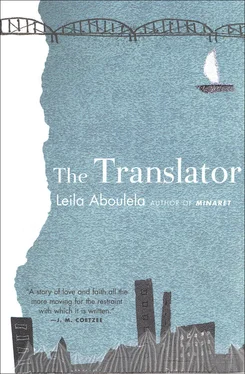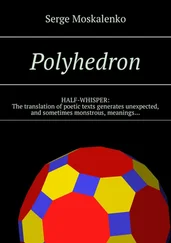Listening to Nahla for hours at a time, Nahla angry because her wedding must be indefinitely postponed, the reasons — a catalogue of problems — her fiance’s work, his lack of work, his frustrated desire to get a job abroad, the fact that they had nowhere to live, the fact that his father was loaded and yet too mean to help out.
She was rarely alone. Almost never alone. At night her aunt would turn over, sit up, pour herself a glass of water from the thermos she kept under her bed. Amir would mumble in his sleep, kick off the covers, dream children’s dreams. First thing in the morning, Dalia would come down, trailing ribbons and comb, a smudged tube of Wellaform. ‘Braid my hair, hurry, I’ll be late for school.’
The Wellaform made Dalia’s hair gleam and stuck on Sammar’s fingers. She wiped them on her own hair and covered it before Dalia’s father came down to bid his mother-in-law good morning, on his way to work. He worked in his family’s ice factory. Every morning he said the same thing, ‘Do you need anything?’ and every morning her aunt replied, ‘Only your well-being.’ Though at any other time of the day she would want him to do this and that, bring this and that, sending messages through Hanan. Sometimes, if there was time, he had coffee with her aunt, Sammar stirring the sugar, offering biscuits. Most often the morning was a rush and he did not have time to sit down. He would hold Dalia by the hand, pretty in her school uniform and braids, greet his mother-in-law and say, ‘Do you need anything, Aunt?’
What was life like? Deprivation and abundance, side by side like a miracle. Surrender to them both. Poverty and sunshine, poverty and jewels in the sky. Drought and the gushing Nile. Disease and clean hearts. Stories from neighbours, relations.
A twenty-year-old smitten with polio, look at him now overweight and ungainly, walking with a crutch.
On the operating table, before they knocked me out with the anaesthetic, I saw flies buzzing above my head…
No this and no that. No water. In this land where the Nile flooded, no water. No water to have a shower with, flush the toilets with, cook, drink. Driving in the car across town to fill big Jerry cans with water from someone else’s garden tap. Tipping buckets of water down the toilet, scooping water from a pail to bathe.
Tempers were short during a water cut. Even shorter than during a power cut. When the water came back, it spluttered and spat out of the taps, dark brown with sediment, poisonous black. Gradually it would lighten. Even then they had to filter it before they drank it or cooked with it. A challenge just to live from day to day, a struggle just to get by. But there were jokes. Jokes about the cuts, rationing and the government. Laughter on hot evenings in the garden, her aunt smiling like in the past, grasshoppers and frogs as loud as the children.
And everyday Amir in his school uniform, white shirt streaked with sweat and dust, scruffy shoes. ‘Why did you lose your pencil?’… ‘No, you’re not allowed to buy candy floss from the man at the gate. It’s full of germs.’
This was her life. Fighting malaria, penicillin powder on the children’s cuts. The curfew at eleven. Immersing herself, losing herself so that there would not be pauses in the day to dwell, no time for fantasies at night.
But she dreamt of him. Dreams in which he brushed past her, would not look at her, would not speak to her. Dreams in which he was busy talking to others. When she sought his attention he frowned and it was a cold look that she received, no fondness. She would wake after such dreams with raw eyes, mumbling and clumsy, dropping things, mislaying things. When asked what was wrong with her, she would say that it was the time of month.
No news of him, his name. In Yasmin’s letters, the words slanting and large: her baby daughter doesn’t sleep through the night, her baby is teething, a photo of the baby, no mention of Rae. When she answered Yasmin’s letters she disciplined herself not to ask about him, not to ask for news or even a casual reference like the remarks she used to hear in Aberdeen all around her in abundance, from Diane, from the coffee-scented secretaries, from his Ph.D. students, the man from Sierra Leone. What she wanted to know: how was he, how was his health, did he have any new Ph.D. students, where did he publish the paper he and Fareed were working on, who translated for him now? This she asked Yasmin, this she finally allowed herself but without using his name, without writing it down. ‘Did they find anyone to take my place?’ she wrote. But Yasmin was on extended maternity leave, in another world with her baby girl, not keen to go back to work, not very interested. She wrote, ‘No, I don’t think the department has anyone translating for them at the moment, I’m not sure.’ And Sammar found herself nostalgic for her old job, the work itself, moulding Arabic into English, trying to be transparent like a pane of glass not obscuring the meaning of any word. She missed the cramped room with the hum of the computer. She missed Diane, the smell of her cheese and onion crisps, her innocence when she said, ‘Rae’s class was really good today. One bloke asked this question about…’
This was the exile from him then. Never hearing his name. Living in a place where no one knew him. And when weak from the dreams, needing to speak of him and not being able to. She wanted to say anything, however meaningless. At times with a friend, Nahla, even with Hanan, she would want to speak about him. A question from them would be the trigger, a question about her time in Scotland. A question followed by a pause in the conversation, the possibility of a turning point and then other words would fill up the space. She was afraid of the sound of her voice talking about him, the silliness of it and feeling ashamed. She knew that they would stop at him being a foreigner, their mind would close after that. Wide eyes, surprise, a foreigner? They would imagine him like someone in an American film. The kind of videos they watched: a bodyguard, a man who was really a robot with skin. She did not want them to imagine him like that. Their eyes rimmed with kohl, warm, wide, and she knowing what was in their minds, having to somehow defend him, stammer through the questions they would ask.
‘No, he’s different, not really…’
‘Half-foreign?’
‘No, he’s just different, not… impatient, not… cool.’
‘I still can’t believe it. A Christian?’
‘Not really, no.’
‘What do you mean?’
‘He’s not religious, he doesn’t go to church. He’s not sure…’
‘Not sure?’
‘He believes in Allah but when I asked him if he accepts that Muhammad, peace be upon him is a Messenger, he said he wasn’t sure.’
‘You, Sammar, of all people? You’re not like modern girls who marry foreigners. You’re not the type.’
‘Anyway it didn’t work. It failed.’
‘But why did you let yourself get involved in the first place?’
Start to talk of him and she would have to answer all sorts of questions, become hot with shyness and what she couldn’t say, that she had tipped over, begged him: just say the shahadah, just say the words and it would be enough, we could get married then. It was not a story to be proud of. Perhaps Hanan would repeat it to her husband, something to amuse him after a hard day’s work. Perhaps Nahla would repeat it to her mother, a piece of gossip from next door. It was sensible to keep quiet, keep busy, forget. She talked to herself, she told herself that she did not know him. She did not understand the words ‘sixties’ scene’ or a Saturday afternoon in Edinburgh when he got married in a church and wore a kilt. How could she understand things like that, be connected to them? She gave herself lectures when the dreams came and weakened her. ‘I must start a new life, stop being sentimental, stop feeling sorry for myself. Everyone around me is deprived of something or another. Some people don’t even have running water in their homes. And all the babies that die and inflation tight around people’s throats. I am so lucky I can afford medicine for my son and Eid clothes, decent meals, even luxuries, useless things like renting videos. I should be thankful. If I was good, if my faith was strong, I would be grateful for what I have.’
Читать дальше












